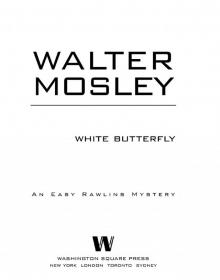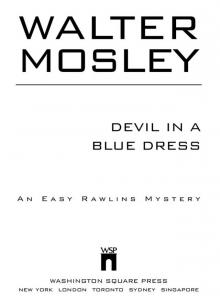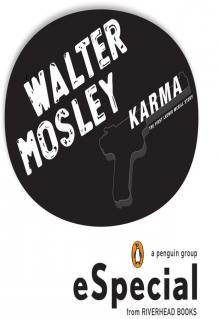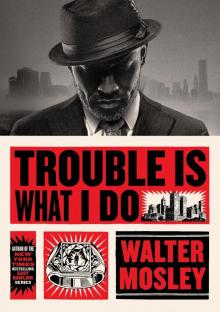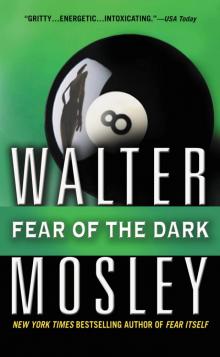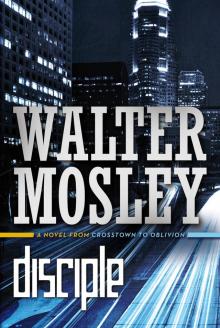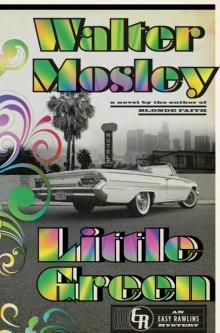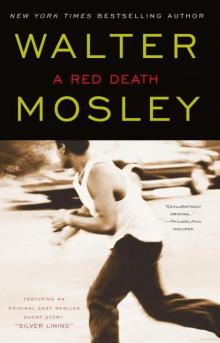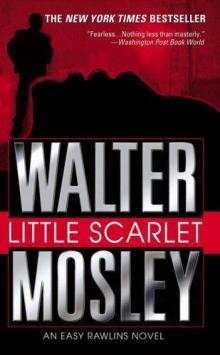White Butterfly, page 1





CRITICAL ACCLAIM FOR WALTER
MOSLEY’S EASY RAWLINS NOVELS
WHITE BUTTERFLY
“Rawlins… might be the best American character to appear in quite some time.”
—Entertainment Weekly
“Compelling.… In all of American fiction, only Richard Wright treats America’s race problem more savagely.”
—Village Voice Literary Supplement
“Startling and powerful.… Mosley handles well the conflict between good and downright dirty that drives the great street detectives of the crime genre.”
—Newsday
“Powerful.… Like its predecessors, White Butterfly provides excitement, social commentary, and clever, syncopated dialogue. If [Philip] Marlowe was tough, Easy has to be even tougher.”
—Washington Post Book World
“White Butterfly crackles with the suspense and wit of vintage Raymond Chandler and Dashiell Hammett, but its keen commentaries on racial issues make it a vital piece of modern fiction.… Mosley has earned a place among contemporary masters of crime fiction.”
—Boston Sunday Herald
DEVIL IN A BLUE DRESS
“I read Devil in a Blue Dress in one sitting and didn’t want it to end. An astonishing first novel.”
—Jonathan Kellerman
“Richly atmospheric.… Devil in a Blue Dress honors the hard-boiled tradition of Hammett/Chandler/Cain in its story line and attitude, but Mosley takes us down some mean streets that his spiritual predecessors never could have.… A fast-moving, entertaining story written with impressive style.”
—Los Angeles Times Book Review
“A suspenseful novel of human detection more than simply a detective novel.… [Mosley is] a talented author with something vital to say about the distance between the black and white worlds, and with a dramatic way to say it.”
—The New York Times
“The social commentary is sly, the dialogue fabulous, the noir atmosphere so real you could touch it. A first novel? That’s what they say. Amazing. Smashing.”
—Cosmopolitan
“This guy has the magic. Devil in a Blue Dress is, without question, the most self-assured, uniquely voiced first novel I’ve ever read. Mosley’s going to be compared with Chandler, but he has a clarity and precision that Chandler never achieved—and a relevance.”
—Andrew Vachss
“Mosley has given American crime fiction another unique hero and a solid mystery, all the way to the brilliant, existential last page.”
—San Francisco Chronicle
GONE FISHIN’
“It is, in some respects, the best of Mosley’s novels.… Mosley displays a pitch-perfect gift for capturing the cadences of black speech that rivals the dialogue in Ralph Ellison’s Invisible Man.”
—Time
“A powerfully raw, lyrical coming-of-age story.… This late encounter with the early Easy offers an extra dimension to readers who have met, in previous stories, the man he grew to be.”
—Publishers Weekly
“Not a straight mystery like the earlier [Easy Rawlins] volumes, Gone Fishin’ is a more spiritual novel that reaches into the characters’ past to reveal their souls.”
—Library Journal
A LITTLE YELLOW DOG
“The best book yet in this fine series. Easy Rawlins [is] one of the most distinctive voices in crime fiction.”
—Seattle Times
“[A] well-energized and crafty volume.”
—The New York Times Book Review
BLACK BETTY
“Detective fiction at its best—bold, breathtaking, and brutal.”
—Chicago Sun-Times
“As always, Mosley’s grip on character is compelling.”
—People
A RED DEATH
“Fascinating and vividly rendered… exotic and believable, filled with memorable and morally complex situations.”
—The Wall Street Journal
“Exhilaratingly original.”
—Philadelphia Inquirer
BOOKS BY WALTER MOSLEY
PUBLISHED BY POCKET BOOKS
Devil in a Blue Dress
A Red Death
White Butterfly
Black Betty
A Little Yellow Dog
Gone Fishin’
WHITE BUTTERFLY
AN EASY RAWLINS MYSTERY
WALTER
MOSLEY
WASHINGTON SQUARE PRESS
NEW YORK LONDON TORONTO SYDNEY
Washington Square Press
A Division of Simon & Schuster, Inc.
1230 Avenue of the Americas
New York, NY 10020
www.SimonandSchuster.com
This book is a work of fiction. Names, characters, places, and incidents either are products of the author’s imagination or are used fictitiously. Any resemblance to actual events or locales or persons, living or dead, is entirely coincidental.
Copyright © 1992 by Walter Mosley
“Lavender” copyright © 2002 by Walter Mosley
Published by arrangement with W. W. Norton & Company, Inc.
All rights reserved, including the right to reproduce this book or portions thereof in any form whatsoever. For information address W. W. Norton & Company, Inc., 500 Fifth Avenue, New York, NY 10110
First Washington Square Press trade paperback printing October 2002
WASHINGTON SQUARE PRESS and colophon are registered trademarks of Simon & Schuster, Inc.
For information about special discounts for bulk purchases, please contact Simon & Schuster Special Sales at 1-800-456-6798 or business@simonandschuster.com
Manufactured in the United States of America
10 9 8 7 6 5
ISBN-13: 978-0-7434-5177-2
ISBN-10: 0-7434-5177-5
eISBN-13: 978-1-4516-1252-3
FOR THE STORIES HE KEEPS ON TELLING,
I DEDICATE THIS BOOK TO LEROY MOSLEY.
FROM WALTER MOSLEY’S SIX EASY PIECES
LAVENDER
IT WAS A TUESDAY morning, about a quarter past eleven. The little yellow dog hid in among the folds of the drapes, peeking out now and then to see if I was still in the reclining living room chair. Each time he caught sight of me, he bared his teeth and then slowly withdrew into the pale green fabric.
The room smelled of lavender and cigarette smoke.
The ticking of the wind-up clock, which I had carried all the way from France after my discharge, was the only sound except for the occasional passing car. The clock was encased in a fine dark wood, its numerals wrought in pale pink metal—copper and tin most probably.
The cars on Genesee sounded like the rushing of wind.
I flicked my cigarette in the ashtray. A car slowed down. I could hear the tires squealing against the curb in front of our house.
A car door opened. A man said something in French. Bonnie replied in the same language. It was a joke of some sort. My Louisiana upbringing had given me a casual understanding of French, but I couldn’t keep up with Bonnie’s Parisian patter.
The car drove off. I took a deep drag on the Pall Mall I was nursing. She made it to the front step and paused. She was probably smelling the mottled yellow-and-red roses that I’d cultivated on either side of the door. When I’d asked her to come live with us she said, “As long as you promise to keep those rosebushes out front.”
The key turned in the lock and the door swung open. I expected her to lag behind because of the suitcase. She always threw the door open first and then lifted the suitcase to come in.
My chair was to the left of the door, off to the side, so the first thing Bonnie saw was the crystal bowl filled with dried stalks of lavender. She was wearing dark blue slacks and a rust-colored sweater. All those weeks in the Air France stewardess uniform made her want to dress down.
She noticed the flowers and smiled but the smile quickly turned into a frown.
“They came day before yesterday.”
Bonnie yelped and leapt backward. The little yellow dog jumped out of hiding, looked around, and then darted out through the open door.
“Easy,” she cried. “You scared me half to death.”
I stood up from the chair.
“Sorry,” I said. “I thought you saw me.”
“What are you doing home?” Her eyes were wild, fearful.
For the first time I didn’t feel the need or desire to hold her in my arms.
“Just curious,” I said.
“What are you talking about?”
I took two steps toward her. I must have looked a little off wearing only briefs and an open bathrobe in the middle of a workday.
Bonnie took a half-step backward.
“The flowers,” I said. “I was wondering about the flowers.”
“I don’t understand.”
“They been sittin’ there since the special-delivery man dropped them off. Me and the kids were curious.”
“About what?”
“Who sent ’em.” The tone of my voice was high and pleasant but the silence underneath was dead.
“I don’t understand,” Bonnie said. I almost believed her.
“They’re for you.”
“Well?” she said. “Then you must have seen the note.”
“Envelope is sealed,” I said. “You know I always try to teach my children that other people’s mail is private. Now what would I look like openin’ your letter?”
She heard the my in “my children.”
Bonnie stared at me for a mome
“Well?”
“From one of the passengers,” she said. “Jogaye Cham. He was on quite a few of the flights.”
“Oh? He send all the stewardesses flowers?”
“I don’t know. Probably. He’s from a royal Senegalese family. His father is a chief. He’s working to unite the emancipated colonies.”
There was a quiet pride in her words.
“He was on at least half of the flights we took and I was nice to him,” Bonnie continued. “I made sure that we had the foods he liked and we talked about freedom.”
“Freedom,” I said. “Must be a good line.”
“You don’t know what you’re talking about,” she said, suddenly angry. “Black people in America have been free for a hundred years. Those of us from the Caribbean and Africa still feel the bite of the white man’s whips.”
It was an odd turn of a phrase–—“the white man’s whips.” I was reminded that when a couple first become lovers they begin to talk alike. I wondered if Jogaye’s speeches concerned the white man’s whips.
I didn’t respond to what she said, just inhaled some more smoke and looked at her.
After a brief hesitation Bonnie picked up her suitcase and carried it into our bedroom. I returned to the big chair, put out the butt and lit up another, my regimen of only ten cigarettes a day forgotten. After a while I heard the shower come on.
I had installed that shower especially for Bonnie.
If someone were to walk in on me right then they might have thought that I was somber but calm. Really I was a maniac trapped by a woman who would neither lie nor tell the truth.
I’d read the note, steamed it open, and then glued it shut. It was written in French but I used a school dictionary to decipher most of the words. He was thanking her for the small holiday that they took on Madagascar in between the grueling sessions with the French, the English, and the Americans. It was only her warm company that kept his mind clear enough to argue for the kind of freedom that all of Africa must one day attain.
If she had told me that it was a gift from the airlines or the pilot or some girlfriend that knew she liked lavender, then I could have raged at her lies. But all she did was leave out the island of Madagascar.
I had looked it up in the encyclopedia. It’s five hundred miles off the West African coastline, almost a quarter million square miles in area. The people are not Negro, or at least do not consider themselves so, and are more closely related to the peoples of Indonesia. Almost five million people lived there. A big place to leave out.
I wanted to drag her out of the shower by her hair, naked and wet, into the living room. I wanted to make her tell me everything that I had imagined her and her royal boyfriend doing on a deserted beach eight thousand miles away.
The bouquet had been sent to her care of the Air France office. Her boyfriend expected them to hold it there. But some fool sent it on, special delivery.
I decided to go into the bathroom and ask her if she expected me to lie down like a dog and take her abuse. My hands were fists. My heart was a pounding hammer. I stood up recklessly and knocked the glass ashtray from the arm of the chair. It shattered. It probably made a loud crashing sound but I didn’t notice. My anger was louder than anything short of a forty-five.
“Easy,” she called from the shower. “What was that?”
I took a step toward the bathroom and the phone rang.
“Can you get that, honey?” she called.
Honey.
“Hello?”
“Easy, is that you?”
I recognized the voice but could not place it for my rage.
“Who is this?”
“It’s EttaMae,” she said.
I sat down again. Actually, I fell into the chair so hard that it tilted over on its side. The end table toppled taking the lamp with it. More broken glass.
“What?”
“I called Sojourner Truth,” she was saying, “and they said you had called in sick.”
“Etta, it’s really you?”
Bonnie came rushing out of the bathroom.
“What happened?” she cried.
Seeing her naked body, thinking of another man caressing it, holding onto the phone and hearing a woman that I had been searching for for months—–I was almost speechless.
“I need a minute, baby,” I said to both women at once.
“Hold on a minute,” I said to Etta while waving Bonnie back to her shower. “Hold on.”
Bonnie stared for a moment. She seemed about to say something and then retreated to the bathroom.
I sat there on the floor with the phone in my lap. If I had a gun in my hand I would have gone outside and killed the yellow dog.
The receiver was making noise so I brought it to my head.
“. . . Easy, what’s goin’ on over there?”
“Etta?”
“Yes?”
“Where have you been?”
“There’s no time for that now, Easy. I got to talk to you.”
“Where are you?”
She gave me an address on the Pacific Coast Highway, at Malibu Beach.
I hung up and went to the bedroom. Three minutes later I was dressed and ready to go.
“Who was that?” Bonnie called from the bathroom.
I went out of the front door without answering because all I had in my lungs was a scream.
I DON’T REMEMBER THE DRIVE from West L.A., where I lived, to the beach. I don’t remember thinking about Bonnie’s betrayal or my crime against my best friend. My mind kind of shorted out and all I could do for a while there was drive and smoke.
There wasn’t another building within fifty yards of the house, but it looked as if it belonged nestled between cozy neighboring homes. The wire fence had been decorated with clam and mussel shells. The wooden railing around the porch had dozens of different colored wine bottles across the top. The house had been built on ground below street level so that it would have been possible to hop on the roof from the curb. It was a small dwelling, designed for one or maybe one and a half.
I opened the gate and descended the concrete stairs. She met me at the door. Sepia-skinned and big-boned, she had always been my standard for beauty. EttaMae Harris had been my friend and my lover in turns. I hadn’t seen her for almost a year because I was the man who had gotten her husband shot.
“You look wild, Easy,” was the first thing she said.
“What?”
“Your hair’s all lumpy and you ain’t shaved. What’s wrong?”
“Where’s LaMarque?”
“He’s with my people up in Ventura.”
“What people?” I asked. My heart skipped and for an instant Bonnie Shay was completely out of my mind.
“Just a cousin’a mines. She got a little place out in the country around there.”
“Where’s Mouse?”
Etta peered at me as if from some great height. She was a witch woman, a Delphic seer, and Walter Cronkite on the seven o’clock news all rolled into one.
“Dead,” she said. “You know he is.”
“But the doctor,” I said, almost pleading. “The doctor hadn’t made the pronouncement.”
“Doctor don’t decide when a man dies.”
“Where is he?”
“Dead.”
“Where?”
“I buried him out in the country. Put him in the ground with my own two hands.”
It was certainly possible. EttaMae was the kind of black woman who made it so hard for the rest. She was powerful of arm and iron willed. She had thrown a full-grown man over her shoulder and carried him from the hospital after knocking out a big white orderly with a metal tray.
“Can I go to the grave?”
“Maybe one day, baby,” she said kindly. “Not soon, though.”
“Why not?”
“Because the hurt is too fresh. That’s why I ain’t called you in so long.”
“You mad at me?”
“Mad at everything. You, Raymond. I’m even mad at LaMarque.”
“He’s just a child, Etta. He ain’t responsible.”
“The child now will become the man,” she preached. “And when he do you can bet he will be just as bad if not worse than what went before.”

